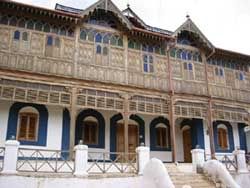
Arthur Rimbaud has his own house/museum in the city of Harar. Perhaps it is in the name of literary tradition that Canadian novelist Camilla Gibb has made a special ode to this walled, Southern Islamic city in Ethiopia in her new book "Sweetness in the Belly".
It is always curious why writers pay such high praises to this city. Although Rimbaud initially said he was living in boredom, he stayed in Harar on-and-off for ten years.
Sir Richard Burton preferred to investigate Harar in his "First Footsteps in East Africa" rather than travel to the northern Christian Highlands of the Amhara people. And even Evelyn Waugh couldn’t see the ancient strength of this Christian civilization, and in his journalistic travelogues "Waugh in Abyssinia" and "Remote People" at times appeared much more complimentary toward the Southern Harare/Somali Muslims. His novel "Scoop", based on his journalistic experience of the fascist invasion of Ethiopia, is centered around the fictional ‘East African’ country of…Ishmaelia. This is all the more surprising in light of Waugh’s recent conversion to Catholicism. But it could just be that he was temporarily side-tracked by the Catholic (yet fascist) Italians. And such a basic Christianity may have been too much to handle.
I suspect that it is mostly atheist/pantheist/agnostic writers who are lured into the facile spirituality (sensuality) of places like Harar. As always with exotic works, the subject rings of the writer/traveler himself, in his spiritual (or similar) quest to find some meaning in his life. Usually, the farther away from home, the better.
The disciplined, ancient and exclusive Christianity of the highlander Amhara is too difficult and too demanding, and too close to home. I think this Biblical fear drives these writers away. It is easier to wallow in the accessible sensuality of a Southern Muslim city, in search of a generalized spirituality.
The Islam of Harar may be beguiling, and easier to enter. But it is far less forgiving and far less compassionate than the Christianity of the austere Highlanders.
From a TVOntario interview of Camilla Gibb, who says that after the events of 9/11, she changed the direction of her novel to take on a ligher, gentler Islam, making her an (atheist) Islam apologoist:
When the capacity for some kind of spiritual life is taken from you, and not even fostered, you can never reclaim it, or at least not in any kind of conventional way... It is curious that a devout atheist should end up writing a book...that has so much to do with spirituality, but I think it is born of a place of envy. |
In line with the above quote, can this be just mere coincidence? "Notes from the Hyena's Belly" came out several years before Gibb's work.